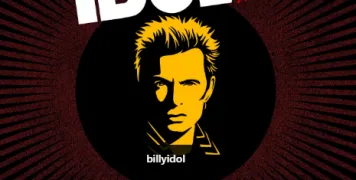Billy Idol Arena da Baixada – Curitiba, Brazil
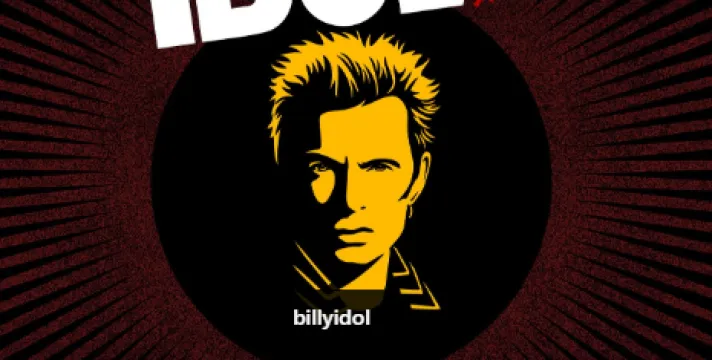
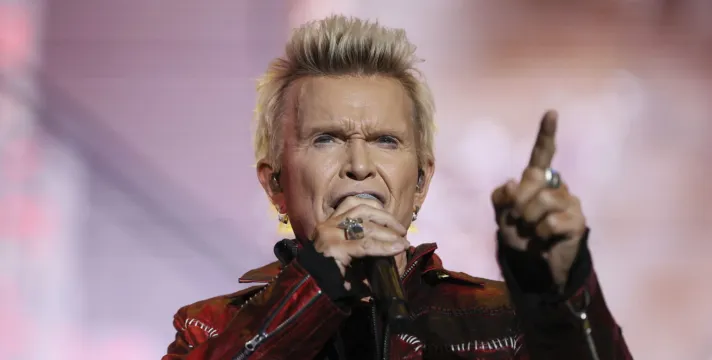
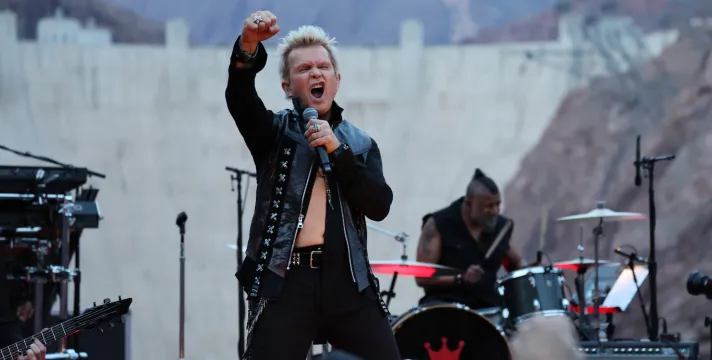
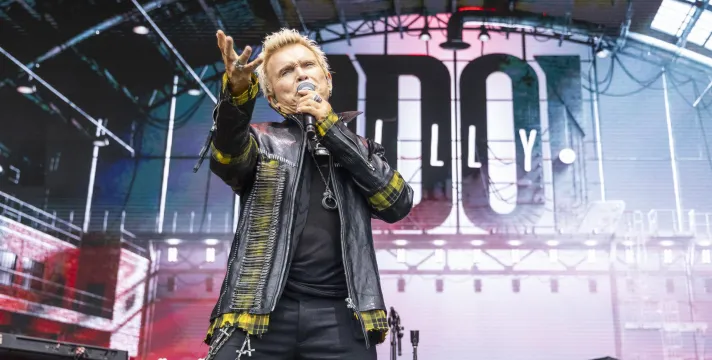
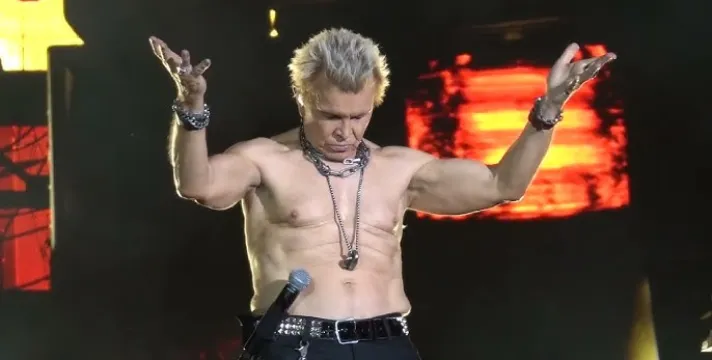

More information about the Package
Billy Idol, whose real name is William Michael Albert Broad, was born on November 30, 1955, in Stanmore, Middlesex, England. He is one of the most recognizable icons of rock and punk from the 1980s, known for his rebellious image, spiked blonde hair, and defiant attitude. His career went through different phases, from his roots in the British punk movement to his rise as a mainstream rock star, consistently marked by his charismatic stage presence, raspy and powerful voice, and a style that blended aggression and sensuality.
Idol’s journey began in his youth when he became involved in the London punk scene, which was emerging as a response to the social and political dissatisfaction of the time. Initially, he was part of the fan group of the Sex Pistols, known as the Bromley Contingent, before forming his own band, Generation X, in 1976. This band was one of the first in the punk movement to achieve a degree of commercial success, mixing the rebellious spirit of punk with more melodic and pop elements. As the lead singer of Generation X, Idol began to develop his rock star persona, with a captivating presence and strong visual appeal. The band released three albums before dissolving in the early 1980s.
After the breakup of Generation X, Billy Idol decided to pursue a solo career in the United States, moving to New York. It was there that he met guitarist Steve Stevens, with whom he would form a lasting creative partnership. Idol’s self-titled debut solo album, released in 1982, included hits like “White Wedding” and “Dancing With Myself,” which quickly became anthems of the youth culture of the time. These successes, strongly supported by music videos played on the newly launched MTV, catapulted Billy Idol to international stardom. His iconic image — the stylized punk look, clenched fists, and sneering smile — became inseparable from the 1980s aesthetic.
His second album, Rebel Yell, released in 1983, cemented his status as one of the decade’s top rock artists. The title track, as well as songs like “Eyes Without a Face” and “Flesh for Fantasy,” demonstrated his ability to combine heavy sounds with pop melodies, exploring themes of desire, rebellion, and identity. The album’s success was once again propelled by his highly stylized music videos and his constant presence on MTV, which had become an essential platform for musical success at the time.
Billy Idol built his reputation on a defiant, almost theatrical posture, mixing punk visuals with an almost glam-rock sensibility. His music often dealt with themes of turbulent love, excess, and self-destruction — themes that mirrored his own life. Throughout the 1980s, he became known not just for his music but for his hedonistic lifestyle, which included wild parties, drug use, and intense, often chaotic relationships. This turbulent personal life led to moments of crisis, including health problems and a serious motorcycle accident in 1990 that nearly ended his career.
Despite these setbacks, Idol managed to release the album Charmed Life that same year, featuring the hit “Cradle of Love,” and continued to explore new sounds, although with more mixed critical and commercial reception. However, as the 1990s progressed and new musical trends like grunge and Britpop emerged, Idol’s style began to feel outdated to mainstream audiences, and his media visibility declined.
For much of the 1990s and early 2000s, he stepped out of the spotlight, battling personal demons but also reflecting on his journey. During this period, he began to reassess his choices and underwent a process of recovery and personal and professional reinvention. In 2005, he released the album Devil’s Playground, his first of original material in over a decade, which marked his return to the scene. Although it did not achieve the commercial success of his earlier work, the album showed that his passion for music and rebellious spirit were still alive.
In the years that followed, Billy Idol maintained a consistent touring schedule, reviving his classics and being rediscovered by new generations. In 2014, he released an autobiography titled Dancing with Myself, in which he detailed his career, childhood, battles with drugs and alcohol, romances, and regrets. The book was well-received and helped solidify his image as a rock survivor — someone who had gone through excess and turmoil but found a new balance without losing his essence.
His collaboration with Steve Stevens remained a constant throughout his career, with the two maintaining a strong artistic relationship over the decades. Idol continued to release new work, such as the The Roadside EP in 2021, which included the track “Bitter Taste,” a reflective and introspective song referencing his motorcycle accident and journey of redemption. This more mature phase of his career was marked by introspection, without losing the energy and authenticity that had always defined him.
Billy Idol is now considered a living rock legend. More than just a figure of the 1980s, he is seen as someone who helped define an era of music, both visually and sonically. His impact goes beyond chart success: he influenced generations of musicians and continues to be revered for his authenticity and resilience. With a career spanning over four decades, Billy Idol represents the essence of rock’s rebellious spirit: bold, provocative, passionate, and, above all, true to himself. He remains a vibrant presence on stage, carrying his legacy to old and new audiences alike — always with that signature sneer and a clenched fist raised in defiance.
Event Name: Billy Idol
When does it happens?: 12/11/2025 ~ 12/11/2025
Where does it take place?: Arena da Baixada – Curitiba, Brazil
Venue
Notes
Billy Idol, whose real name is William Michael Albert Broad, was born on November 30, 1955, in Stanmore, Middlesex, England. He is one of the most recognizable icons of rock and punk from the 1980s, known for his rebellious image, spiked blonde hair, and defiant attitude. His career went through different phases, from his roots in the British punk movement to his rise as a mainstream rock star, consistently marked by his charismatic stage presence, raspy and powerful voice, and a style that blended aggression and sensuality.
Idol’s journey began in his youth when he became involved in the London punk scene, which was emerging as a response to the social and political dissatisfaction of the time. Initially, he was part of the fan group of the Sex Pistols, known as the Bromley Contingent, before forming his own band, Generation X, in 1976. This band was one of the first in the punk movement to achieve a degree of commercial success, mixing the rebellious spirit of punk with more melodic and pop elements. As the lead singer of Generation X, Idol began to develop his rock star persona, with a captivating presence and strong visual appeal. The band released three albums before dissolving in the early 1980s.
After the breakup of Generation X, Billy Idol decided to pursue a solo career in the United States, moving to New York. It was there that he met guitarist Steve Stevens, with whom he would form a lasting creative partnership. Idol’s self-titled debut solo album, released in 1982, included hits like “White Wedding” and “Dancing With Myself,” which quickly became anthems of the youth culture of the time. These successes, strongly supported by music videos played on the newly launched MTV, catapulted Billy Idol to international stardom. His iconic image — the stylized punk look, clenched fists, and sneering smile — became inseparable from the 1980s aesthetic.
His second album, Rebel Yell, released in 1983, cemented his status as one of the decade’s top rock artists. The title track, as well as songs like “Eyes Without a Face” and “Flesh for Fantasy,” demonstrated his ability to combine heavy sounds with pop melodies, exploring themes of desire, rebellion, and identity. The album’s success was once again propelled by his highly stylized music videos and his constant presence on MTV, which had become an essential platform for musical success at the time.
Billy Idol built his reputation on a defiant, almost theatrical posture, mixing punk visuals with an almost glam-rock sensibility. His music often dealt with themes of turbulent love, excess, and self-destruction — themes that mirrored his own life. Throughout the 1980s, he became known not just for his music but for his hedonistic lifestyle, which included wild parties, drug use, and intense, often chaotic relationships. This turbulent personal life led to moments of crisis, including health problems and a serious motorcycle accident in 1990 that nearly ended his career.
Despite these setbacks, Idol managed to release the album Charmed Life that same year, featuring the hit “Cradle of Love,” and continued to explore new sounds, although with more mixed critical and commercial reception. However, as the 1990s progressed and new musical trends like grunge and Britpop emerged, Idol’s style began to feel outdated to mainstream audiences, and his media visibility declined.
For much of the 1990s and early 2000s, he stepped out of the spotlight, battling personal demons but also reflecting on his journey. During this period, he began to reassess his choices and underwent a process of recovery and personal and professional reinvention. In 2005, he released the album Devil’s Playground, his first of original material in over a decade, which marked his return to the scene. Although it did not achieve the commercial success of his earlier work, the album showed that his passion for music and rebellious spirit were still alive.
In the years that followed, Billy Idol maintained a consistent touring schedule, reviving his classics and being rediscovered by new generations. In 2014, he released an autobiography titled Dancing with Myself, in which he detailed his career, childhood, battles with drugs and alcohol, romances, and regrets. The book was well-received and helped solidify his image as a rock survivor — someone who had gone through excess and turmoil but found a new balance without losing his essence.
His collaboration with Steve Stevens remained a constant throughout his career, with the two maintaining a strong artistic relationship over the decades. Idol continued to release new work, such as the The Roadside EP in 2021, which included the track “Bitter Taste,” a reflective and introspective song referencing his motorcycle accident and journey of redemption. This more mature phase of his career was marked by introspection, without losing the energy and authenticity that had always defined him.
Billy Idol is now considered a living rock legend. More than just a figure of the 1980s, he is seen as someone who helped define an era of music, both visually and sonically. His impact goes beyond chart success: he influenced generations of musicians and continues to be revered for his authenticity and resilience. With a career spanning over four decades, Billy Idol represents the essence of rock’s rebellious spirit: bold, provocative, passionate, and, above all, true to himself. He remains a vibrant presence on stage, carrying his legacy to old and new audiences alike — always with that signature sneer and a clenched fist raised in defiance.
Our services and how to purchase
All service offers for the event Billy Idol are provided by companies with years of experience in tourism, whether they are transport, receptive or hotel companies.
Payment methods vary from: in cash to installments with or without credit card, reaching up to 12 installments of equal value, depending on the start date of your trip.
To purchase the package for Billy Idol is very simple, the first step is to register on our website and after validating your account, access our website logged in and follow the step by step:
- 1º Step - Select the Number of Passengers;
- 2º Step - Select Package Type; ranging from simple packages such as BUS TRIP, HOTELS and SHUTTLE to more complex trips the EXPERIENCE with several services already included in a single package.
- 3º Step – Choose Day or days of the event, festival or show you wish to attend.
After this selection of items, our system will search and present what we currently have available based on your choice.
Depending on your Package choices, additional services may still appear, such as: tickets, travel insurance, local transfers, among several other services offered by our providers, which can be contracted individually for each passenger in your purchase.
Just follow the step by step and customize your package, until the final payment step.
Still have questions about our packages?
Our service channels are always open to clarify your doubts before making your purchase through our Contact Form , Email or Whatsapp.
